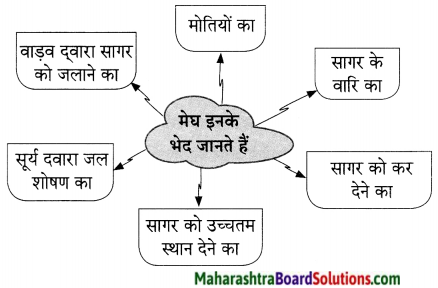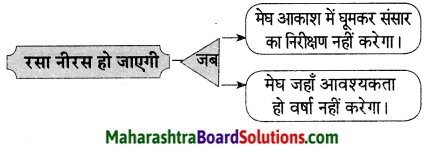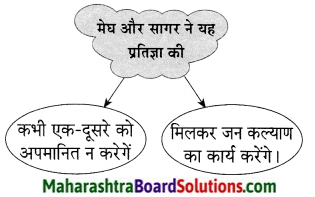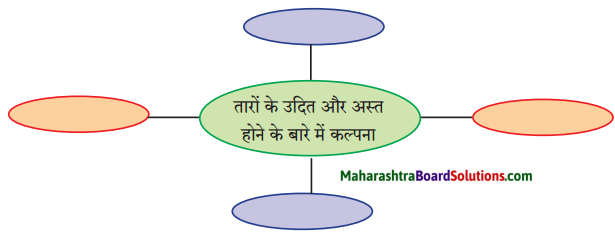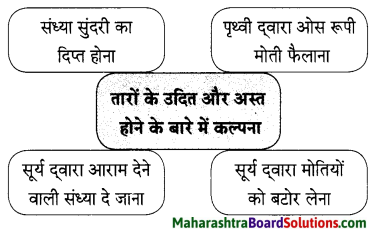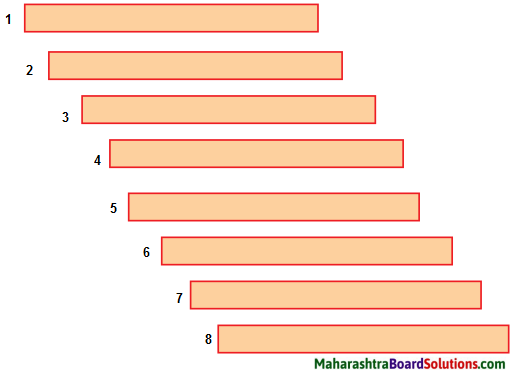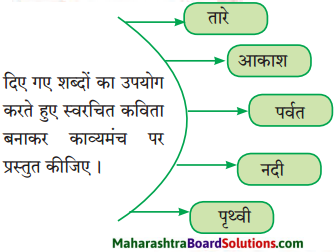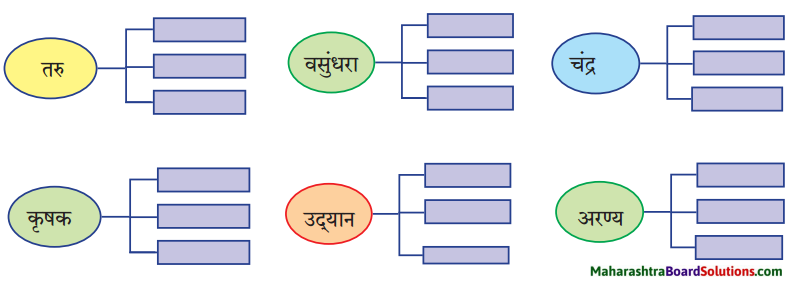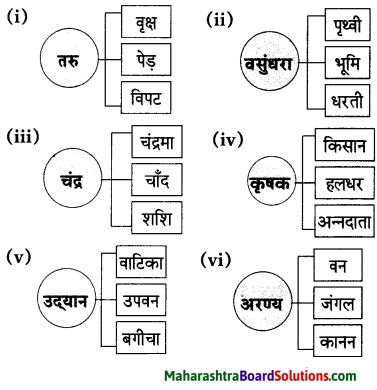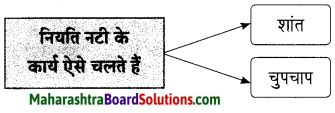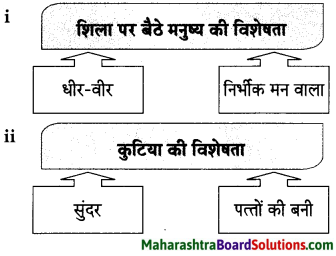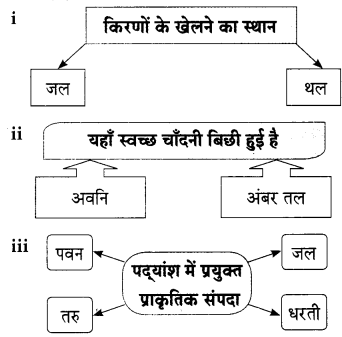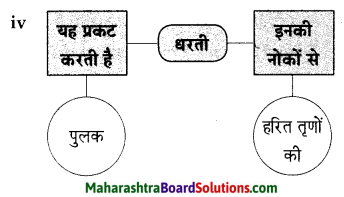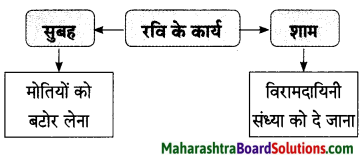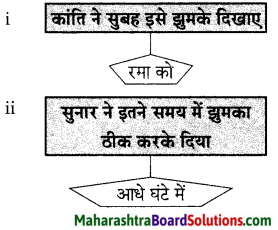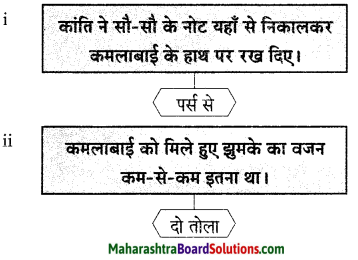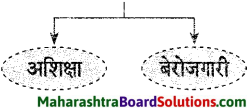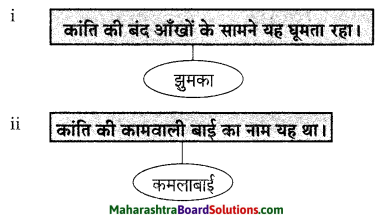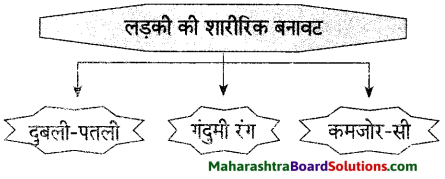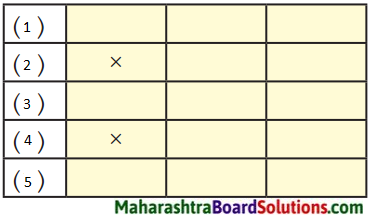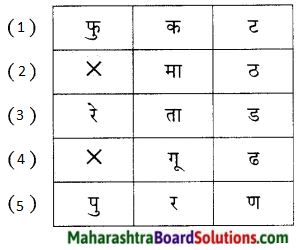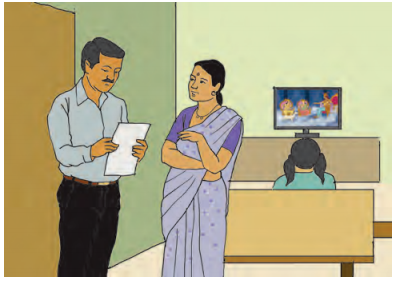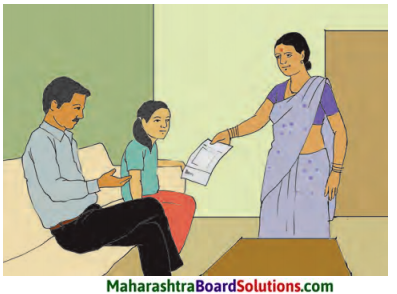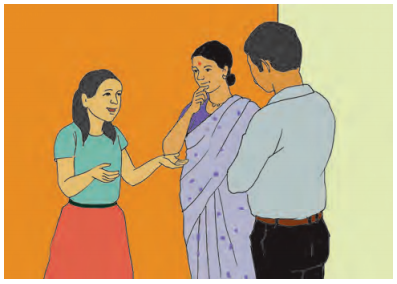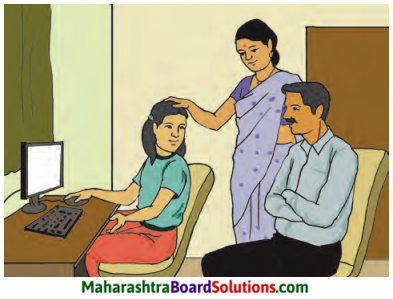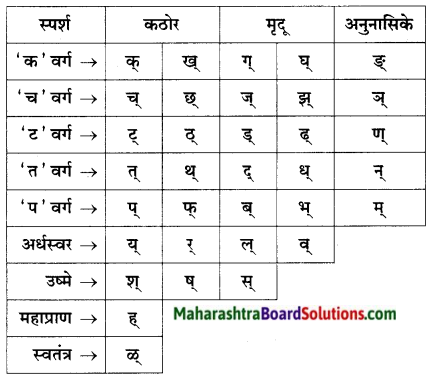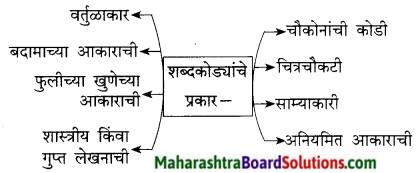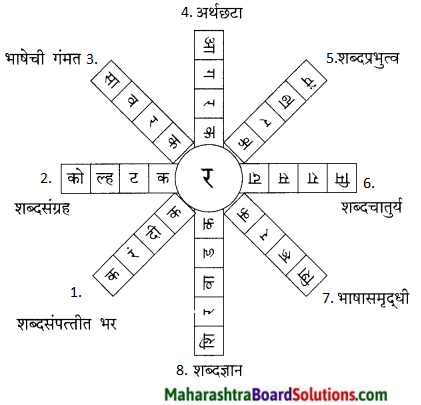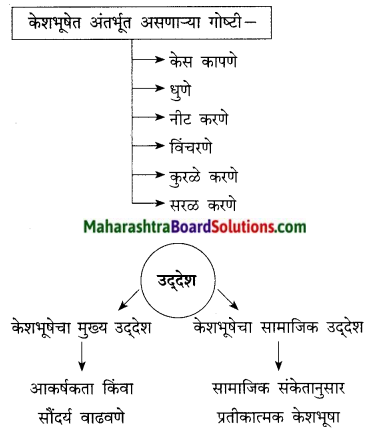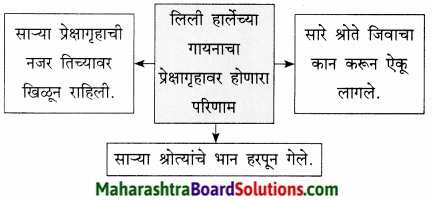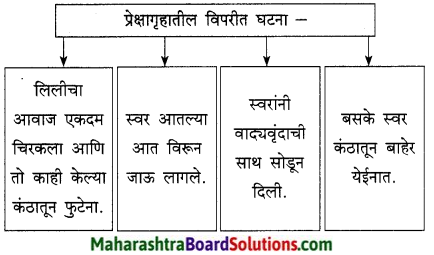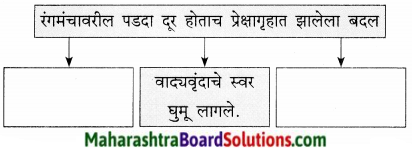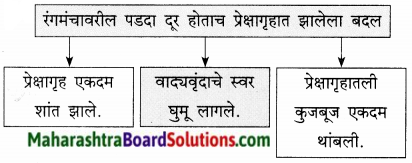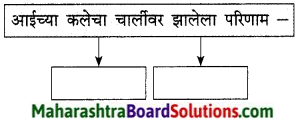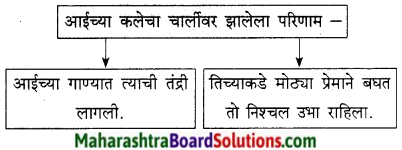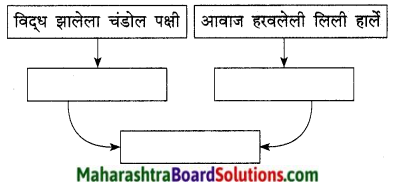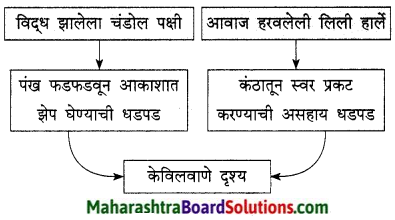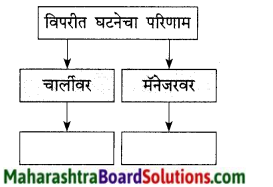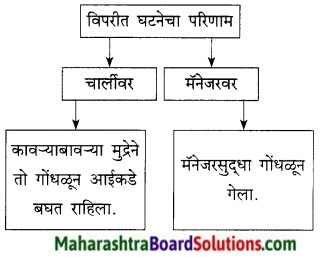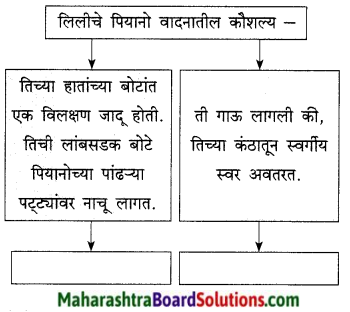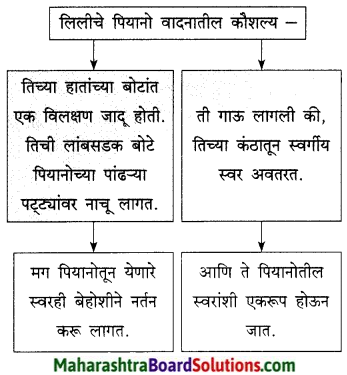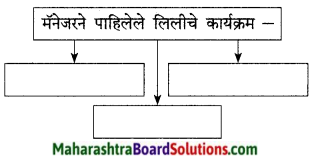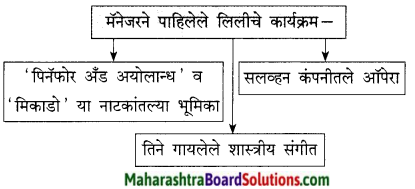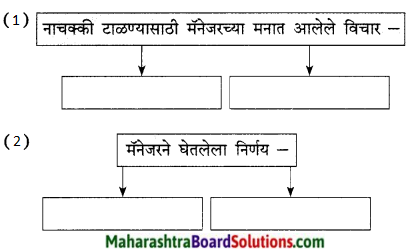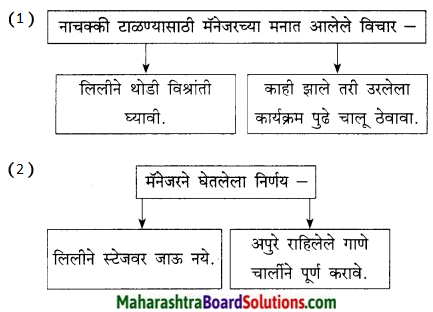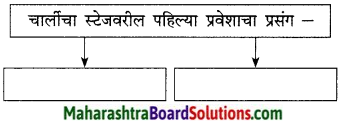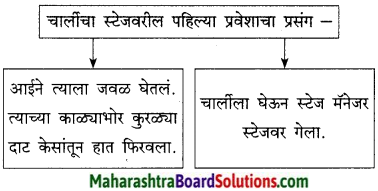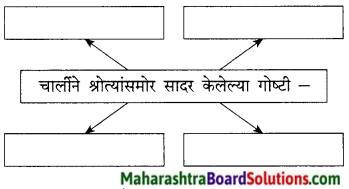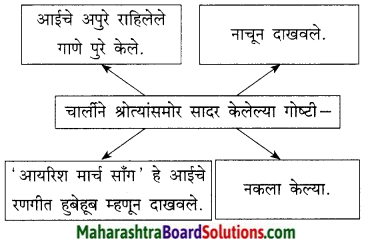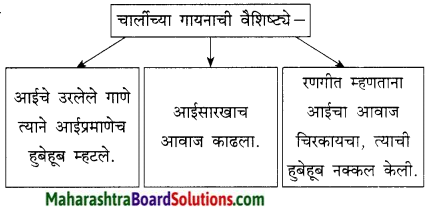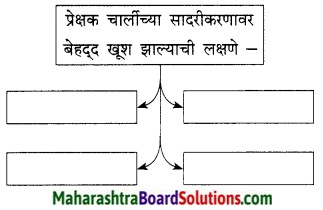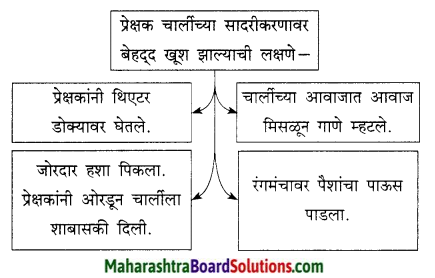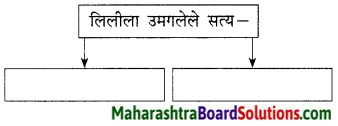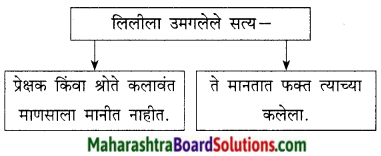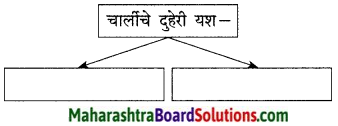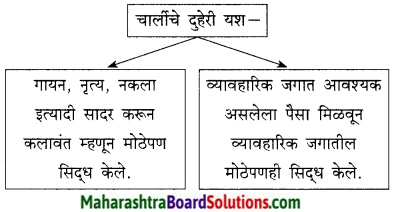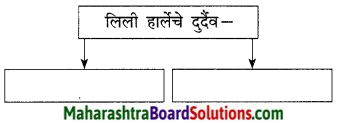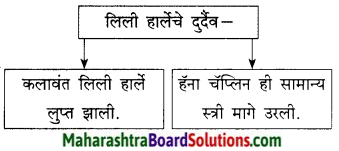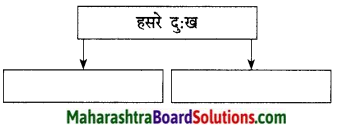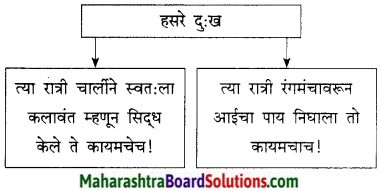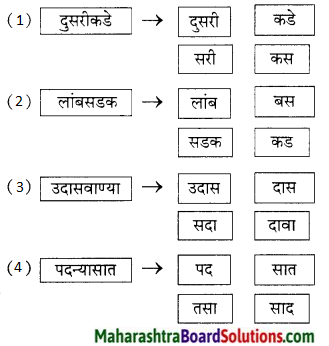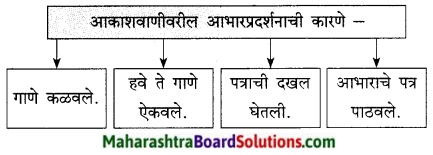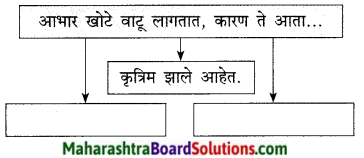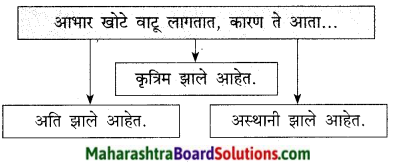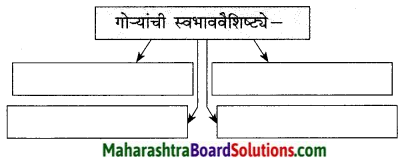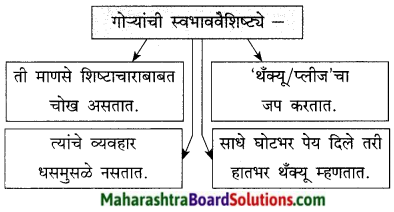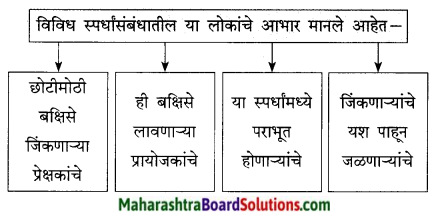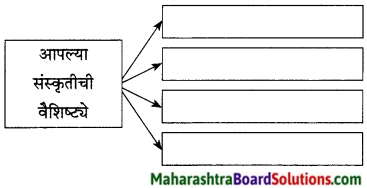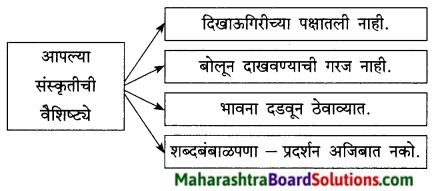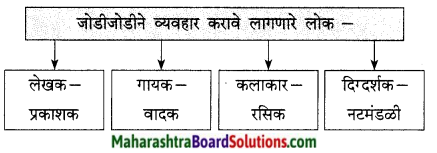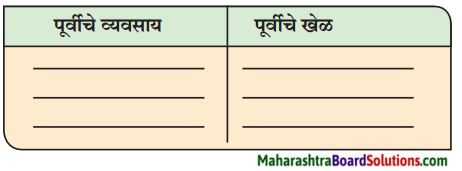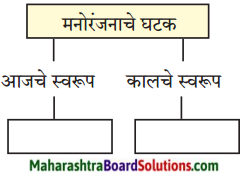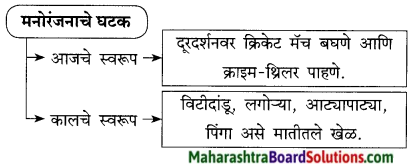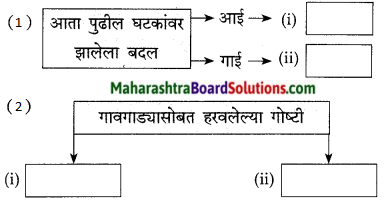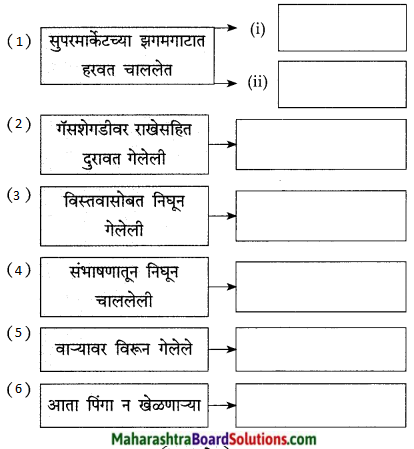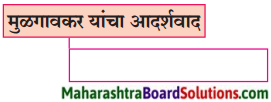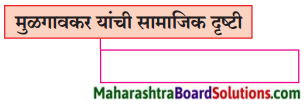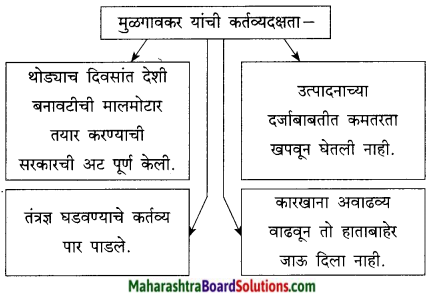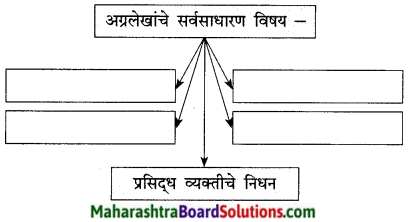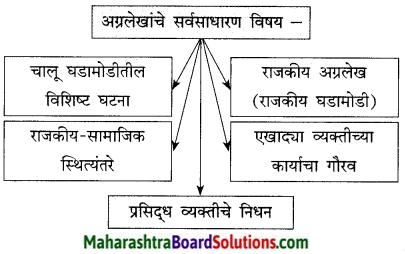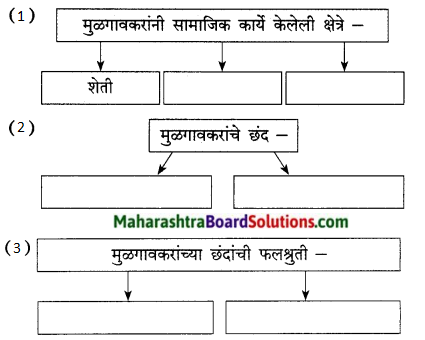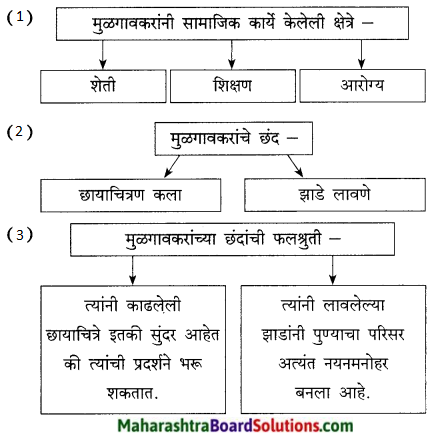Balbharti Maharashtra State Board Class 9 Hindi Solutions Hindi Lokvani Chapter 7 छोटा जादूगर Notes, Textbook Exercise Important Questions and Answers.
Std 9 Hindi Chapter 7 Chota Jadugar Question Answer Maharashtra Board
Hindi Lokvani 9th Digest Chapter 7 छोटा जादूगर Questions And Answers
1. संजाल पूर्ण लिखिए
प्रश्न 1.
संजाल पूर्ण लिखिए
उत्तर :
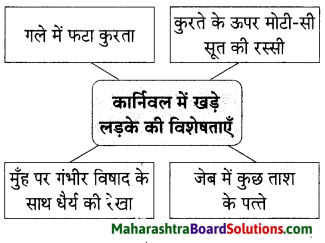
2. छोटा जादूगर कहानी में आए पात्रः
प्रश्न 1.
छोटा जादूगर कहानी में आए पात्रः
उत्तरः

3. ‘पात्र’ शब्द के दो अर्थ लिखिए।
प्रश्न 1.
‘पात्र’ शब्द के दो अर्थ लिखिए।
उत्तर :
i. अभिनेता
ii. बरतन
![]()
4. विधान को सही करके लिखिए।
प्रश्न 1.
विधान को सही करके लिखिए।
i. ताश के सब पत्ते पीले हो गए।
ii. खेल हो जाने पर चीजें बटोरकर उसने भीड़ में मुझे देखा।
उत्तर :
i. ताश के सब पत्ते लाल हो गए।
ii. खेल हो जाने पर पैसा बटोरकर उसने भीड़ में मुझे देखा।
![]()
5. भाषाई कौशल पर आधारित पाठगत कृतियाँ।
भाषा बिंदु :
प्रश्न 1.
रिक्त स्थानों की पूर्ति अव्यय शब्दों से कीजिए और नया वाक्य बनाइए।
उत्तर:
i. जहाँ एक लड़का चुपचाप देख रहा था।
वाक्य:
मोहन नदी की लहरों को चुपचाप देख रहा था।
ii. मैं उसकी ओर न जाने क्यों आकर्षित हुआ।
वाक्य:
हिंसक शेर मेरी ओर चला आ रहा था।
iii. हाँ! मैं सच कहता हूँ बाबू जी।
वाक्य :
हाँ! मैं छोटा जादूगर हूँ।
iv. अकस्मात किसी ने ऊपर के हिंडोले से पुकारा।
वाक्य :
अकस्मात रमेश छत के ऊपर से कूद गया।
v. मैं बिना बुलाए भी कहीं जा पहुँचता हूँ।
वाक्य:
मैं बिना पढ़े परीक्षा नहीं देता हूँ।
vi. लेखकों और वक्ताओं की न जाने क्या दुर्दशा होती।
वाक्य :
मोहन और गणेश एक अच्छे मित्र हैं।
vii. वाह ! क्या बात।
वाक्य:
वाह ! आप मैच जीत गए।
viii. वह बाजार गया क्योंकि उसे किताब खरीदनी थी।
वाक्य :
मै प्रतिदिन पड़ता हूँ क्योंकि मुझे परीक्षा में अच्छे अंक लाने हैं।
![]()
6. रचनात्मकता की ओर संभाषणीय
प्रश्न 1.
माँ के लिए छोटे जादूगर के किए हुए प्रयास समावण बताइए।
उत्तर:
छोटा जादूगर अपनी माँ की दवा के लिए कार्निवाल के मैदान में जाता है, जहाँ पर उसकी मुलाकात लेखक से होती है। वह उन्हें अपनी माँ और पिता जी के बारे में बताता है। लेखक द्वारा शरबत पिलाने के बाद वह उनसे कहता है कि यदि आप मुझे शरबत न पिलाकर मेरा खेल देखकर कुछ पैसे दे देते तो माँ के लिए मैं पथ्य ले लेता। लेखक जब उसे निशानेबाजी के लिए ले गए तो उसने सभी बारह खिलौने जीत लिए।
लेखक फिर उससे कोलकाता के बोटेनिकल उद्यान में मिले जहाँ पर वह खिलौनों को लेकर तमाशा दिखाकर अपनी माँ के लिए एक सूती कंबल खरीदने की इच्छा लिए था। एक दिन लेखक जब मोटर से हावड़ा की ओर जा रहे थे तो वह छोटा जादूगर उन्हें एक झोंपड़ी के पास खड़ा मिला। उसने लेखक को बताया कि अस्पतालवालों ने उसकी माँ को निकाल दिया है। जब लेखक झोपड़ी के अंदर गए तो उन्होंने देखा कि छोटा जादूगर अपनी माँ के शरीर पर कंबल डाले उससे लिपट कर निरीह भाव से उसे निहार रहा है।
एक दिन छोटा जादूगर निर्मल धूप में सड़क के किनारे अपना तमाशा दिखा रहा था किंतु उसकी वाणी में प्रसन्नता न थी। लेखक द्वारा पूछने पर उसने बताया कि उसकी माँ का समय समीप है और उसने मुझे जल्दी घर बुलाया है। फिर वह पैसा बटोरकर लेखक के साथ अपने घर को चल दिया किंतु घर पहुँचकर पता चला कि उसकी माँ अब नहीं रही।
![]()
7. मौलिक सृजन :
प्रश्न 1.
‘माँ’ विषय पर स्वरचित कविता प्रस्तुत कीजिए।
उत्तर:
है साथ मेरे हरदम, बनकर एक साया,
उसने ही मेरा जीवन महकाया।
तकलीफ में भी मुस्काती है,
हर गम खुशी से सह जाती है।
मेरी राहों पर फूल बिछाती वो,
खुद काँटों पर सो जाती है।
ममता की सूरत है माँ,
भगवान की छवि कहलाती माँ ।
![]()
8. आसपास :
प्रश्न 1.
अपने विद्यालय के किसी समारोह का सूत्र संचालन कीजिए।
उत्तर:
सूत्र-संचालन (गणतंत्र दिवस)
आज के इस आज़ादी के जश्न में, मैं रामकुमार विद्यालय में पधारे हमारे अपने सभी खासो-ओ-आम का बहुत-बहुत स्वागत करता हूँ-जय हिंद कहता हूँ। मैं अपने सभी विशिष्ट अतिथियों, समाजसेवियों, हमारे गुरुजनों, सभी पधारे हुए आज़ादी के दीवानों और हमारे साथियों को हमारे विद्यालय की तरफ से गणतंत्र दिवस की शुभकामनाएँ देता हूँबधाइयाँ देता हूँ। शुभकामनाएँ इसलिए कि हमने लगभग 200 साल की परतंत्रता सहन करने के बाद यह अनमोल आज़ादी की फ़िज़ा पाई है।
और यह आज़ादी, यह अपनी पसंद से जीने का अधिकार हमें सदा प्राप्त हो ऐसी शुभकामनाओं के साथ मैं रामकुमार हमारे विद्यालय की तरफ से आप सब देशभक्तों का इस आज़ादी के जश्न में स्वागत करता हूँ-वंदे मातरम कहता हूँ। वतन पर मर-मिटने के ज़माने गुज़र गए, मज़ा तो अब इसके लिए जीने में है। अपनी आज़ादी अपनी संप्रभुता के लिए एक बार जोरदार तालियाँ बजा दीजिए।
धन्यवाद! जी हाँ साथियों, ये जो हमारे अमर शहीदों ने बलिदानों के बीज इस मातृभूमि पर रोपे थे, आज उनकी टहनियों पर महकते फूल खिल आए हैं। इन फूलों की महक इस देश में ही नहीं, सारे संसार में फैले, इस कामना के साथ आइए आज के इस महोत्सव का शुभारंभ करते हैं।
इक चमक ताब इक मदहोशी, हर आलम चंगा होता है, इक हूक चमकती आँखों में, हर कतरा गंगा होता है। दिल में मतवाली मौज पले, मन सात आसमाँ छूता है, जब-जब अपने इन हाथों में, लहराता तिरंगा होता है। तो आइए, मित्रों ! सर्वप्रथम हम अपनी आन-बान-शान के प्रतीक हमारे राष्ट्रीय ध्वज तिरंगे का ध्वज वंदन करें।
![]()
9. पाठ के आँगन में :
प्रश्न 1.
सियारामशरण गुप्त जी द्वारा लिखित ‘काकी’ पाठ के भावपूर्ण प्रसंग को शब्दांकित कीजिए।
उत्तर :
‘काकी’ शीर्षक कहानी में एक बच्चे के मन के भावों का वर्णन किया गया है। एक दिन श्यामू ने देखा कि उसकी माँ सिर से लेकर पैर तक कपड़ा ओढ़े हुए भूमि पर लेटी हुई है । घर के लोग उसे घेरे हुए रो रहे हैं, पर श्यामू को कुछ समझ में नहीं आ रहा था कि क्या हो रहा है? लोग जब उसकी माँ के मृत शरीर को उठाकर ले जाने लगे, तब उसने रो-रोकर तमाशा कर दिया। उसे बहुत समझाया गया फिर भी वह रोता रहा। कुछ दिन पश्चात् उसके मित्रों द्वारा पता चला कि उसकी माँ ऊपर राम के घर चली गई।
एक दिन श्यामू ने आकाश में पतंग उड़ते देखा। उसने सोचा,क्यों न वह एक पतंग आकाश में उड़ा दे और उसकी माँ पतंग के सहारे राम के घर से नीचे उतर आएगी। उसने पिता (काका) से पतंग दिलाने के लिए कहा, पर पिता ने पतंग नहीं दिलाई। एक दिन श्यामू ने अपने पिता की जेब से एक चवन्नी चुराई और अपने मित्र भोला से पतंग मँगवा ली। श्यामू ने सोचा पतंग पर ‘काकी’ लिखकर उड़ा देंगे और काकी इसे पकड़कर नीचे आ जाएगी।
भोला, श्यामू से अधिक समझदार था। उसने श्यामू को समझाया कि पतंग की डोर पतली है, काकी का भार सम्भाल नहीं पाएगी और टूट जाएगी। दूसरे दिन श्यामू ने अपने पिता की कोट से एक रूपया चुराया और मोटी रस्सी मँगवाई। जब श्यामू और भोला पतंग में रस्सी बाँध रहे थे, तभी श्यामू के पिता आ धमके और जब उन्हें पता चला कि श्याम ने उनकी जेब से पैसा निकाला है, तो उनको बहुत गुस्सा आया।
उन्होंने श्यामू को मारा और पतंग फाड़ दी। उनके डाँटने पर डर के कारण भोला ने बताया कि वह पतंग के सहारे अपनी काकी (माँ) को नीचे उतारना चाहता था। विश्वेश्वर ने जब भोला की बात सुनी तो उन्हें बहुत दुख हुआ। पतंग पर चिपके कागज पर ‘काकी’ लिखा देखकर वे हैरान रह गए। इस पाठ में बाल मन के निश्छल, निष्कपट प्रेम की मार्मिक अभिव्यक्ति की गई है।
Hindi Lokvani 9th Std Textbook Solutions Chapter 7 छोटा जादूगर Additional Important Questions and Answers
(क) गद्यांश पढ़कर दी गई सूचना के अनुसार कृतियाँ कीजिए।
कृति क (1) : आकलन कृति
प्रश्न 1.
निम्नलिखित कश्चन सत्य है या असत्य लिखिए।
- लड़के की जेब में पेड़ के कुछ पत्ते थे।
- दोनों शरबत पीकर निशाना लगाने चले।
- लड़के के स्वभाव में संपूर्णता थी।
उत्तर :
- असत्य
- सत्य
- असत्य
कृति क (2) : शब्द संपदा
प्रश्न 2.
गद्यांश से समानार्थी शब्द ढूँढकर लिखिए।
i. दुख
ii. कारागार
उत्तर :
i. विषाद
ii. जेल
![]()
प्रश्न 3.
निम्नलिखित शब्दों के विलोम शब्द लिखिए।
i. गरम × ……….
ii. बीमार × ………..
उत्तर :
i. ठंडा
ii. स्वस्थ
कृति क (3) : स्वमत अभिव्यक्ति
प्रश्न 1.
अपने नगर में आयोजित किसी जादू के तमाशे का आँखों देखा वर्णन कीजिए।
उत्तर :
‘जीवन में जिस प्रकार खेलकूद और मनोरंजन के लिए अनेक प्रकार के साधन उपलब्ध हैं, उन्हीं में से एक है जादू का तमाशा। एक दिन हमारे शहर में भी जादू के तमाशे का समाचार अखबार में छपा। अगले ही दिन पिता जी हमें जादू का खेल दिखाने ले गए। हमने टिकटें खरीदी और अंदर गए। थोड़ी देर बाद जादूगर स्टेज पर आया। उसने जैसे ही सबको अभिवादन किया ऊपर से फूल बरसने लगे।
फिर उसने अपनी टोपी उतारकर दिखाई जो एकदम खाली थी लेकिन उसने उसमें हाथ डाला तो खरगोश बाहर निकला और भाग गया। उसने दोबारा हाथ डाला तो तितलियाँ निकलकर उड़ने लगीं। हम सब यह देखकर हैरान हो गए। इसके बाद अगले खेल में उसने अलग-अलग रंगों के कपड़ों की तीन-चार छोटी-छोटी पट्टियाँ मुँह में रख ली और हवा में हाथ घुमाया। फिर मुंह से पट्टियाँ बाहर निकाली तो रंग-बिरंगे रूमाल निकलते चले गए। ऐसा जादू हमने कभी नहीं देखा था और अंत में, हम सब आपस में चर्चा करते हुए खुशी-खुशी घर लौटे।
![]()
(ख) गद्यांश पढ़कर दी गई सूचना के अनुसार कृतियाँ कीजिए।
कृति ख (1) : आकलन कृति
प्रश्न 1.
चौखट पूर्ण कीजिए।
उत्तर :

प्रश्न 2.
निम्नलिखित प्रश्नों के उत्तर लिखिए।
i. छोटा जादूगर को तब अधिक प्रसन्नता होती जब –
ii. देखने वाले इसलिए दंग रह गए क्योंकि –
उत्तर :
i. लेखक उसे शरबत न पिलाकर उसका खेल देखकर कुछ पैसे दे दिया होता।
ii. छोटा जादूगर पक्का निशानेबाज निकला। उसकी कोई गेंद खाली नहीं गई।
कृति ख (2) : शब्द संपदा
प्रश्न 1.
उचित प्रत्यय लगाकर नए शब्द बनाइए।
i. बीमार
ii. तमाशा
उत्तर :
i. बीमार + ई = बीमारी
ii. तमाशा + ई = तमाशाई
![]()
प्रश्न 2.
गद्यांश से विलोम शब्द ढूँढकर लिखिए।
i. झूठ × ……………
ii. नीचे × …………..
उत्तर :
i. सच
ii. ऊपर
कृति ख (3) : स्वमत अभिव्यक्ति
प्रश्न 1.
जो व्यक्ति जीवन में अपना लक्ष्य हासिल करना चाहते हैं, वे बचपन से ही सपने देखा करते हैं। अपने विचार लिखिए।
उत्तर:
लक्ष्य को पाने के लिए व्यक्ति को बचपन से ही प्रयास करना पड़ता है। जो व्यक्ति दृढ़ निश्चयी होते हैं, वे बचपन से ही सपने देखते हैं। कल्पना चावला, न्यूटन, डॉ. अब्दुल कलाम आदि महापुरुषों ने बचपन से ही अपने लक्ष्य तक पहुंचने का सपना देखा था और उस दिशा में कोशिश एवं अथक परिश्रम करना शुरू कर दिया था। इसी कारण वे अपने लक्ष्य तक पहुँच सके थे।
![]()
(ग) गद्यांश पढ़कर दी गई सूचना के अनुसार कृतियाँ कीजिए।
कृति ग (1) : आकलन कृति
प्रश्न 1.
संजाल पूर्ण कीजिए।
उत्तर:
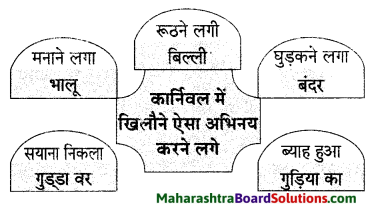
प्रश्न 2.
कृति पूर्ण कीजिए।
उत्तर:
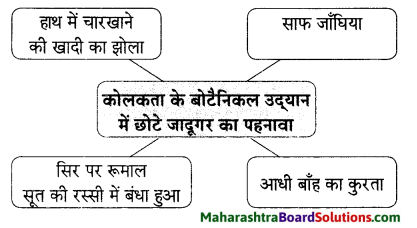
कृति ग (2) : शब्द संपदा
प्रश्न 1.
लिंग परिवर्तन कीजिए।
i. गुड़िया – ………….
ii. जादूगर – …………
उत्तर :
i. गुड्डा
ii. जादूगरनी
![]()
कृति ग (3) : स्वमत अभिव्यक्ति
प्रश्न 1.
‘जीवन में माँ का महत्त्व’ पर अपने विचार व्यक्त कीजिए।
उत्तर:
हमारे जीवन में माँ का बहुत महत्त्व होता है। एक बालक का संपूर्ण संसार माँ ही होती है। माँ जीवन की प्रथम गुरु होती है। वह हमें चलना, बोलना और पढ़ना सिखाती है। उसके दिए संस्कारों से ही मनुष्य अपने चरित्र का निर्माण करता है। वह हमारे लिए पढ़ाई-लिखाई, भोजन, कपड़े आदि का इंतजाम करती है। सचमुच, माँ सेह, ममता, सद्भावना और कर्तव्य-पालन की जीवंत मूर्ति होती है।
(घ) गद्यांश पढ़कर दी गई सूचना के अनुसार कृतियाँ कीजिए।
कृति घ (1) : आकलन कृति
प्रश्न 1.
आकृति पूर्ण कीजिए।
उत्तर:
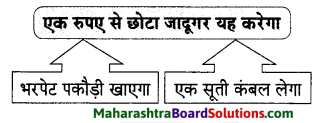
प्रश्न 2.
सत्य या असत्य पहचानकर लिखिए।
i. गले की सूत की डोरी टुकड़े-टुकड़े होकर जुट गई।
ii. लेखक इडेन गार्डेन देखने के लिए चले।
उत्तर :
i. सत्य
ii. असत्य
![]()
प्रश्न 3.
समझकर लिखिए।
i. लेखक ने झोपड़ी में यह देखा –
उत्तर:
एक स्त्री चिथड़ो में लदी हुई काँप रही थी।
कृति घ (2) : शब्द संपदा
प्रश्न 1.
लिंग परिवर्तन कीजिए।
i. श्रीमती
ii. स्त्री
उत्तर :
i. श्रीमान
ii. पुरुष
प्रश्न 2.
गद्यांश से शब्द-युग्म ढूँडकर लिखिए।
उत्तर :
i. टुकड़े-टुकड़े
ii. धीरे-धीरे
![]()
कृति ग (3) : स्वमत अभिव्यक्ति
प्रश्न 1.
‘अपने बचपन में नन्हें कलाकारों को अपना तमाशा दिखाते हुए देखा होगा…’ इस पर अपने विचार व्यक्त कीजिए।
उत्तर:
मैंने अपने बचपन में अनेक नन्हें कलाकारों को तमाशा दिखाते हुए देखा है। वे बाल कलाकार तमाशा दिखाते और उनके बदले कुछ पैसे या अनाज लेकर अपना पेट पालते हैं। यद्यपि उनके अंदर अनेक गुण होते हैं किंतु विषम परिस्थिति होने के कारण उनका वह गुण संपूर्ण दुनिया के सामने नहीं आ पाता है और वह जीवन पर्यंत सिर्फ अपना पेट ही पालते रह जाते हैं। सरकार और समाज को चाहिए कि वह इस प्रकार के बच्चों के लिए अलग से शिक्षा व्यवस्था करें तथा उन्हें आगे बढ़ने के लिए प्रोत्साहन और अवसर प्रदान करें; जिससे ये बच्चे भी दुनिया में अपनी अलग पहचान बना सकें।
(ङ) गद्यांश पढ़कर दी गई सूचना के अनुसार कृतियाँ कीजिए।
कृति ङ (1) : आकलन कृति
प्रश्न 1.
उत्तर लिखिए।
i. लेखक का मन यहाँ से ऊब गया था –
ii. लेखक ने सड़क के किनारे यह देखा –
उत्तर :
i. कोलकाता से
ii. छोटे जादूगर का रंगमंच सजा हुआ।
प्रश्न 2.
विधानों को सही करके लिखिए।
i. तब भी तुम जादू दिखाने चले आए।
उत्तर :
i. तब भी तुम खेल दिखाने चले आए।
![]()
कृति ङ (2) : शब्द संपदा
प्रश्न 1.
उपसर्ग लगाकर शब्द बनाइए।
i. समय
ii. परिचित
उत्तर:
i. अ + समय = असमय
ii. अ+ परिचित – अपरिचित
प्रश्न 2.
गद्यांश से समानार्थी शब्द ढूँढकर लिखिए।
i. छुट्टी
ii. चेष्टा
उत्तर :
i. अवकाश
ii. प्रयत्न
प्रश्न 3.
गद्यांश से शब्द-युग्म ढूँढ़कर लिखिए।
उत्तर:
i. चलते-चलते
ii. सुख-दुख
![]()
कृति छ (3) : स्वमत अभिव्यक्ति
प्रश्न 1.
‘माँ की ममता’ पर अपने विचार लिखिए।
उत्तर:
हमारे जीवन में सबसे महत्त्वपूर्ण इंसान ‘माँ’ होती है। वह हमेशा हमारे साथ रहती है और हर पल हमारा ध्यान रखती है। ढेर सारे दुख और पीड़ा सहकर वह हमें अपनी कोख में रखती है। वह अपने वास्तविक जीवन में हमेशा हमारे बारे में सोचकर खुश हो जाती है। एक माँ अपने बच्चों की खुशी के आगे अपनी खुशी को कुछ नहीं समझती। वह हमेशा हमारी हर क्रिया और हँसी में अपनी रुचि दिखाती है। उसके पास एक नि:स्वार्थ आत्मा है और प्यार तथा जिम्मेदारी से भरा दयालु दिल है।
छोटा जादूगर Summary in Hindi
लेखक-परिचय :
जीवन-परिचय :
जयशंकर प्रसाद का जन्म उत्तर प्रदेश के वाराणसी जिले के सरायगोवर्धन में हुआ था। प्रसाद जी की प्रारंभिक शिक्षा काशी में क्वींस कालेज में हुई, किंतु बाद में घर पर इनकी शिक्षा का व्यापक प्रबंध किया गया, जहाँ संस्कृत, हिंदी, उर्दू तथा फारसी का अध्ययन इन्होंने किया। प्रसाद जी हिंदी साहित्य के छायावादी कवियों के चार प्रमुख स्तंभों में से एक हैं। प्रसाद जी बहुमुखी प्रतिभा के धनी थे। ये हिंदी साहित्य में कवि, नाटककार, कथाकार, उपन्यासकार तथा निबंधकार के रूप में प्रसिद्ध हैं।
प्रमुख कृतियाँ :
- काव्य – ‘झरना’ , ‘आँसू’, ‘लहर’, आदि।
- महाकाव्य – ‘कामायनी’
- ऐतिहासिक नाटक – ‘स्कंदगुप्त’,’चंद्रगुप्त’, ‘धुवस्वामिनी।
- कहानी संग्रह – ‘प्रतिध्वनि’, ‘आकाशदीप’, ‘इंद्रजाल’ आदि।
- उपन्यास – ‘कंकाल’, ‘तितली,’ ‘इरावती’।
![]()
गद्य-परिचय :
संवादात्मक कहानी: किसी विशेष घटना की रोचक एवं आकर्षक ढंग से संवाद के रूप में प्रस्तुति ‘संवादात्मक कहानी’ कहलाती है।
प्रस्तावना : प्रस्तुत कहानी में लेखक ने एक लड़के के जीवन संघर्ष, बीमार माँ की देखभाल और उसके चातुर्यपूर्ण साहस को बड़े ही रोचक ढंग से प्रस्तुत किया है। मानवीय संवेदना की मार्मिक अभिव्यंजना ‘छोटे जादूगर’ के माध्यम से की गई है।
सारांश :
प्रस्तुत कहानी में लेखक ने एक लड़के के जीवन संघर्ष को उजागर किया है। इस कहानी में जयशंकर प्रसाद खुद एक पात्र हैं; जो एक लड़के के मन को पढ़ने का प्रयत्ल कर रहे हैं। उस समय के वातावरण का वर्णन करते हुऐ प्रसाद जी लिखते हैं कि कार्निवाल के मैदान में बिजली के जगमगाहट, हँसी और विनोद के कलनाद के बीच वे उस लड़के की तरफ आकर्षित हुए जिसके गले में फटे कुरते के ऊपर से एक मोटी सूत की रस्सी पड़ी थी और उसके जेब में कुछ ताश के पत्ते थे।
लेखक उसे खेल दिखाने ले गए। रास्ते में बातचीत के दौरान लेखक को पता चला कि लड़के के घर में उसके माँ और पिताजी भी हैं। उसके पिता जी देश के लिए जेल में बंद हैं और माँ बीमार है। लड़के ने लेखक को बताया कि उसकी माँ बीमार है और उसके दवा के लिए वह तमाशा दिखाकर कुछ पैसे इकट्ठा करना चाहता है। माँ के प्रति ममता देखकर लेखक उसे निशाना लगाने की जगह ले गए। जहाँ लड़के ने बारह खिलौने जीते और वहाँ से नौ-दो ग्यारह हो गया।
एक बार फिर लेखक को वह छोटा जादूगर कोलकाता के सुरम्य बोटेनिकल उद्यान में दिखाई दिया जहाँ लेखक अपनी मित्र मंडली के साथ जलपान कर रहे थे। लेखक के मना करने के बावजूद उनकी श्रीमती ने उस लड़के को तमाशा दिखाने के लिए कहा। लड़के ने अपना तमाशा दिखाया जिसे देखकर सब लोग प्रसन्न हुए और लेखक सोचता रहा कि ‘बालक को आवश्यकता ने कितना शीघ्र चतुर बना दिया है। यही तो संसार है।
एक दिन शाम के समय लेखक अपनी गाड़ी से हावड़ा की ओर जा रहे थे तो वह छोटा जादूगर उन्हें झोपड़ी के पास मिला और उनको बताया कि अस्पतालवालों ने उसकी माँ को निकाल दिया है। लेखक ने अंदर जाकर देखा तो उसकी माँ झोंपड़ी में चिथड़ों से लिपटी हुई पड़ी थी।
लेखक की जेहन में वह छोटा जादूगर घर कर गया। वह सोचता है कि छोटा जादूगर कितना निश्छल, कितना परिश्रमी, बाल-सुलभ चेष्टाएँ और बीमार माँ की जिम्मेदारी किस तरह वहन करता है।
एक दिन लेखक जब जा रहे थे तो उन्होंने छोटे जादूगर को तमाशा दिखाते हुए देखा किंतु उस जादूगर की वाणी में वह प्रसन्नता न देखकर उन्होंने कारण पूछा तो लड़के ने बताया कि उसकी माँ बहुत बीमार है और घर जल्दी आने को बोली है। लेखक उसे लेकर उसके घर पहुँचे तो उसकी बीमार माँ के मुख से सिर्फ ‘बे …’ शब्द निकलकर ही रह गया। जादूगर अपनी माँ से लिपटकर रोने लगा।
![]()
शब्दार्थ :
- विषाद – दुख
- हिंडोले – झूला
- जलपान – नाश्ता
- घुड़कना – डॉटना
- वाचालता – अधिक बोलना
- जीविका – रोजी-रोटी
- ईर्ष्या – जलना, दवेष
- चिथड़ा – फटा पुराना कपड़ा
- बेष्टा – प्रयत्न
- समीप – पास, निकट, नजदीक
- अनुपात – प्रमाण, तुलनात्मक
- समग्न – संपूर्ण
- जगमगाना – चमकना
- कलनाद – मधुर ध्वनि
- गंभीर – गहरा, भारी
- सहमत – एकमत, राजी
- पथ्य – रोगी को दिया जाने वाला भोजन
- सुरम्य – बहुत सुंदर, रमणीय
- कमलिनी – छोटा कमल
- सयाना – बुद्धिमान
- बटोरना – समेटना, इकट्ठा करना
- अस्ताचलगामी सूर्य – पश्चिम दिशा में भागता हुआ सूरज
- स्मरण – स्मृति, याद
- स्फूर्तिमान – सक्रिय
- अविचल – स्थिर
- स्तब्ध – संज्ञाहीन, स्थिर
- विनोद – प्रसन्नता, खेल-कूद
- फुहारा – फव्वारा
- धैर्य – शांति
- निकम्मा – जो कोई काम न करता हो
- तिरस्कार – अपमान
- व्यग्र – व्याकुल
- उद्यान – बगीचा, फुलवारी
- अभिनय – भावाभिव्यक्ति
![]()
मुहावरे :
- दंग रहना – चकित होना
- मन ऊब जाना – उकता जाना
Hindi Lokvani 9th Std Digest पहली इकाई

